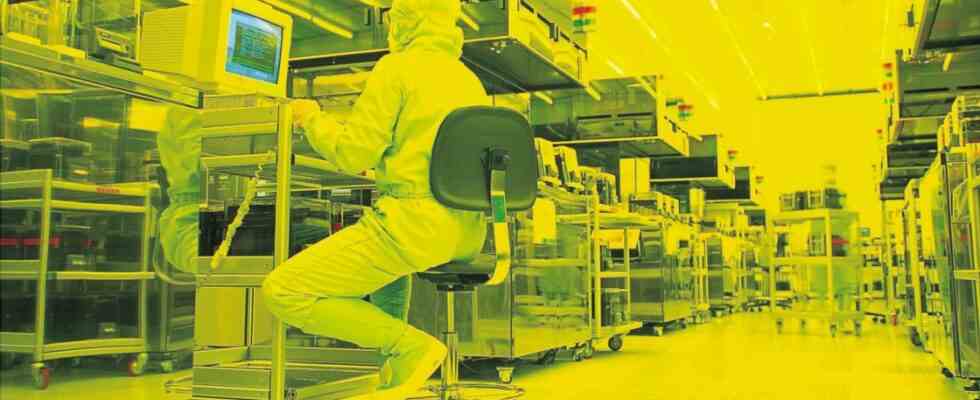Despite Chinese threats in recent weeks, the US has announced formal trade talks with Taiwan. The governments in Washington and Taipei want to meet in “early fall” for a first round of negotiations on closer economic relations, said the office of US Trade Representative Katherine Tai. The leadership in Beijing is fuming – but their hands are largely tied as long as they depend on access to Taiwan’s high technology.
Washington and Taipei presented plans for closer economic cooperation in June. Now Tai’s office was given the official negotiating mandate. The top US official responsible for East Asian affairs, Daniel Kritenbrink, emphasized that it is about establishing “resilient and secure supply chains” between the US and Taiwan. This is a reference to Taiwan’s strategic bargaining chip, its semiconductor industry. Taiwan is the world’s leading supplier of computer chips, without which no smartphone or car runs. The small silicon discs with billions of tiny switches on the surface of a fingernail are the linchpin of Taipei’s economic relations with the USA, China and Germany.
For Taiwan, a trade deal with the US would be primarily a symbolic victory. Taipei hopes that the talks will give its companies better access to the American market. Trade in agricultural products and access to the financial markets are also to be strengthened. The greatest success, however, would be if the way were paved for other international trade pacts, from which the island has been excluded at the insistence of China. This would also make Taiwan more independent of mainland China, to which around 40 percent of all Taiwanese exports still go.
Beijing’s foreign ministry spokesman Wang Wenbin immediately said after the announcement that China would not accept other countries signing official trade and economic agreements with Taiwan. The spokesman stressed that the democratically ruled island was viewed by Beijing as an “inseparable part” of the communist people’s republic and reserved “all necessary measures” to defend Chinese sovereignty.
It is questionable whether China’s leadership can afford a military conflict with Taiwan
Tensions between the United States, Taiwan and China had recently escalated following a visit by US House Speaker Nancy Pelosi to Taipei. It was the highest-ranking visit from the United States in a quarter of a century. In response, Beijing began military maneuvers around the democratic island republic. In Beijing’s biggest show of force in recent decades, Chinese forces practiced a sea and air blockade of Taiwan and conquered the island. If necessary, Beijing wants to take the island by force. If China invades, however, it risks a military confrontation with Taiwan’s protecting power, the United States. And whether Chinese ruler Xi Jinping can afford it is questionable. He wants to have a third term approved at a party conference in the fall, since a possible military defeat by the United States would be a high risk. And the domestic economy is gasping under the zero-Covid policy, so China doesn’t need expensive trade wars.
This is reflected in the economic sanctions that Beijing has enacted against Taipei. Among other things, China has banned the import of fish and citrus fruits from Taiwan. However, food accounts for just 0.4 percent of trade with Taiwan. Almost 70 percent of Taiwan’s total exports of more than $300 billion to China, on the other hand, are technology – and Beijing hasn’t touched on that yet because it would deny itself access to the latest generation of computer chips. China’s top leadership is increasingly frustrated by years of failure to develop domestically-made semiconductors, despite investing more than $100 billion in the sector in recent years.
The US government’s chip production subsidy package is putting additional pressure on China
According to experts, the Chinese chip companies like SMIC are technologically years behind their Taiwanese competitors like TSMC. And here China feels additionally attacked by a US government subsidy package worth 50 billion dollars, with which the chip production is supposed to be brought back to America. The reason: the US government has made it a requirement that manufacturers only receive the subsidy if they no longer manufacture modern chips in China. That would cement China’s dependence on foreign technology imports for years, until its own industry catches up at some point. Beijing remains in an uncomfortable position in the dispute over Taiwan. On the one hand, Xi needs to show strength, on the other hand, he doesn’t want an escalation.
Meanwhile, China’s neighbor Vietnam could turn out to be the laughing third party in the disputes between the world powers. The country is increasingly attracting investors, deterred by China’s constant lockdowns and risks of escalation around Taiwan. This is how the Japanese business medium reported Nike Asia most recently that the US technology group Apple has the production of its wristwatch Apple Watch and the laptop Macbook tested in the country. Apple’s Chinese production partner Luxshare and Foxconn from Taiwan are involved in the test. The cooperation between the three brawlers apparently still works.

